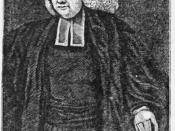Only a fraction of the English population participated in choosing their representatives. In some districts all the free adult males could vote, and in order to vote, the man had to have enough property to yield 40 shillings worth of produce or rent a year. In most of the elections however, the people really had no voice. The aristocrats usually agreed in advance, who would represent the people (it was an "under the table"ÃÂ type of deal). Later, the original counties started to become empty and desolate and new counties started to pop up. Representatives kept on coming from the desolate counties, but none came from the populous ones. This made many people mad. To suppress this anger the Commons stated that, "a member of the House of Commons represented not the people who chose him, but the whole country, and he was not responsible to any particular constituency."ÃÂ Colonial assemblies were a lot more representative than the House of Commons.
The uncontested elections were far fewer than in England, and the distribution of representatives was more rational. Every town in the NE colonies had the right to send delegates to the assembly. The unit of representation outside the NE colonies was usually counties. The political organization of new counties was on track with the rapid advance westward and the representation was never as uneven as in England. To colonists representation was a means of acquainting the government with their needs and demands and with the amount and method of taxation they could most easily bear. A colonial assemblyman was supposed to be the agent of the people that chose him. He was supposed to look after the interests of the people first and then those of the colony. Representative government in America was something different from that in England.


